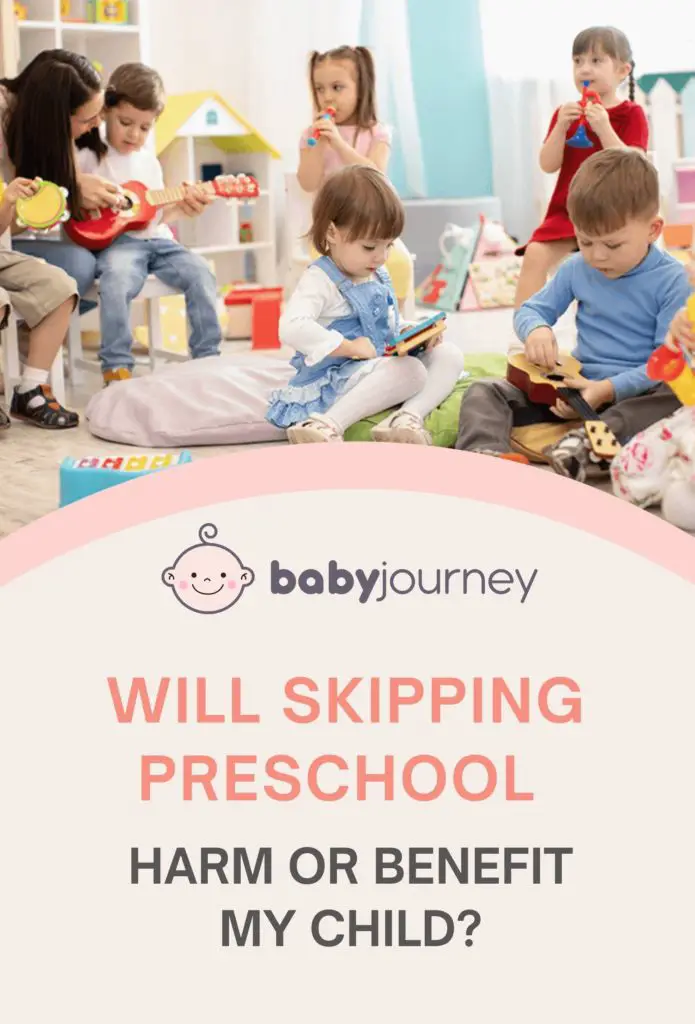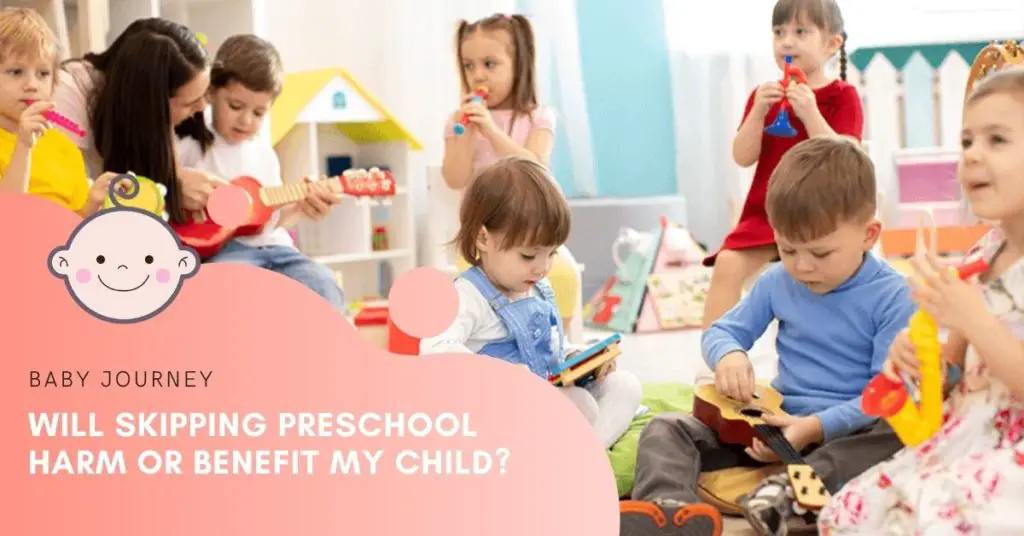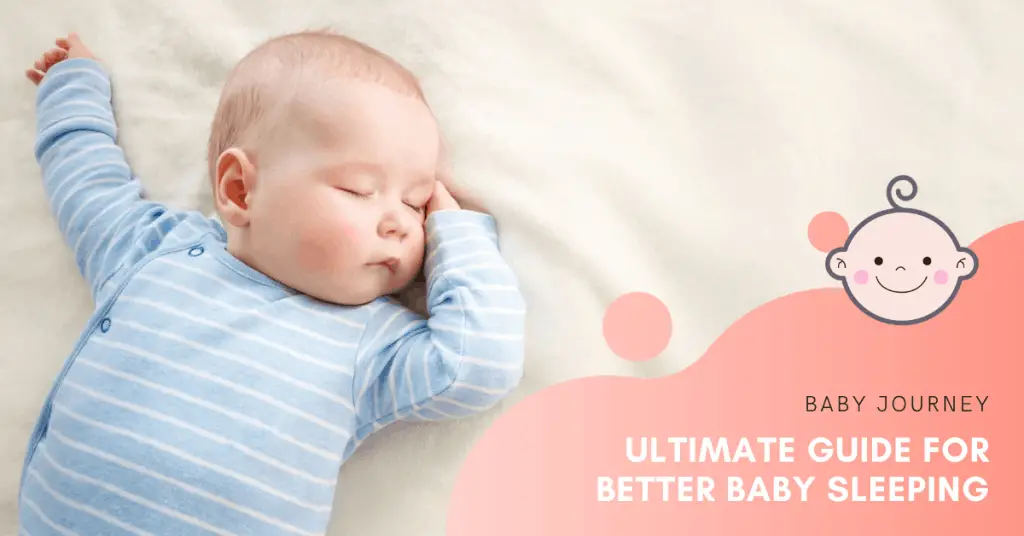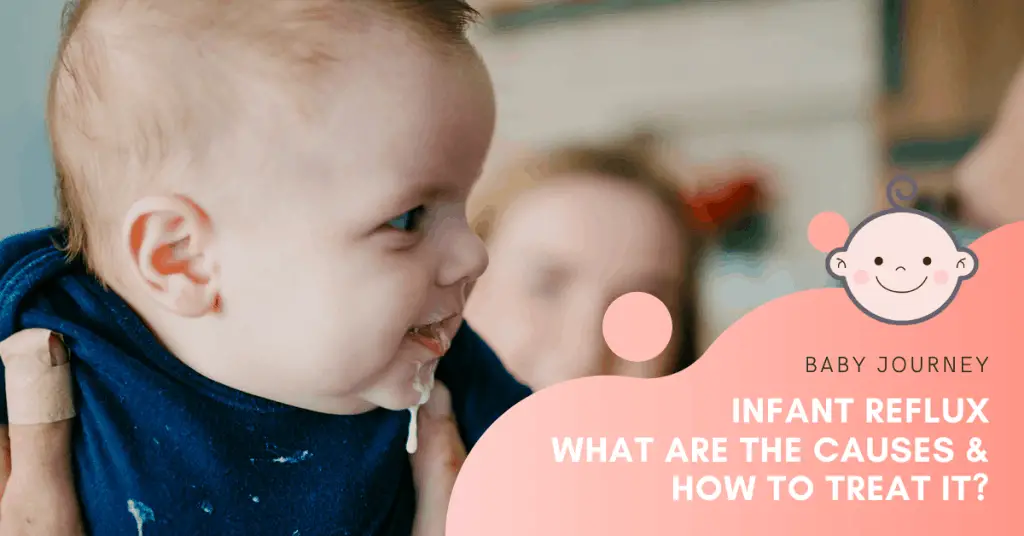Some parents love the idea of preschool. It’s a trial run before sending your kiddo off to kindergarten. With often shorter days and less strict classroom settings, it can be a great way to have them dip their toe into the water of formal education.
However, other parents think it is too much too soon. Why rush your kids into the education system when you could be cherishing those precious bonding years at home before they’re gone on weekdays? Let children play!
But is skipping preschool a bad idea? In this guide, we will cover everything you need to know about the different types, pros and cons of preschool, plus some thoughts about the matter from parents and experts!
When Is Preschool for Young Children?
You may be saying, “Hey, when is preschool anyways?”. Well, it can vary from school to school. However, most centers consider preschool classrooms to consist of children ages 3 to 5.
Some federally funded programs, like Head Start [1], require that children be four years old by the fall they start the program. Others move “young fives” or kids who are five but not in kindergarten to pre-K.
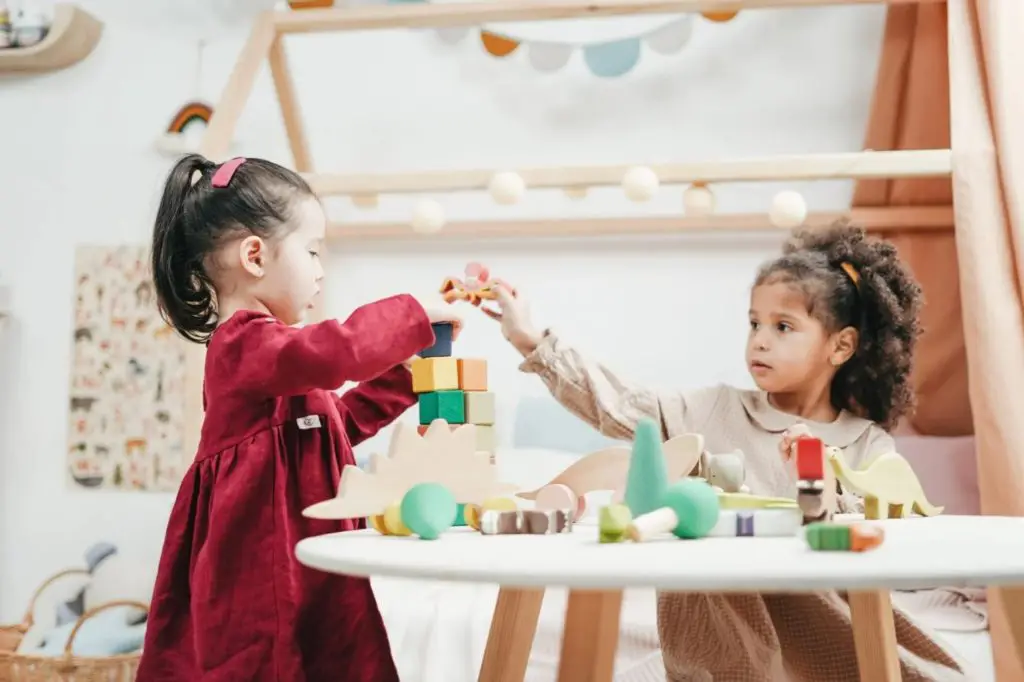
Here are the most common terms you will encounter when considering preschool versus daycare and preschool vs pre k. Daycare accepts kids from about six weeks of age to five years and may or may not have a preschool program.
Pre-K is a program that kids can enter the year before elementary school kindergarten. Depending on their birthday this could be when they are four or five.
Kindergarten is a formal program for young kids run by a public or private school. Most kindergarteners are five or six years old and must be a certain age by a certain month to be accepted.
The exact answer to the question of when do kids start preschool depends on your program. But for a parent who sends their children to childcare, the timeline is daycare, preschool, pre-K, kindergarten, with preschool beginning anywhere from 3- to 5-year-old.
What is the Difference Between Daycare, Preschool, and Pre-K?
Who knew there were so many options for your little one? Your family may struggle with what to do and when, that is normal!
Your first option is daycare. The best age to put a child in daycare completely depends on your family situation. Some parents enroll their baby at six weeks because they have to go to work and have no one to watch their child.
Daycare
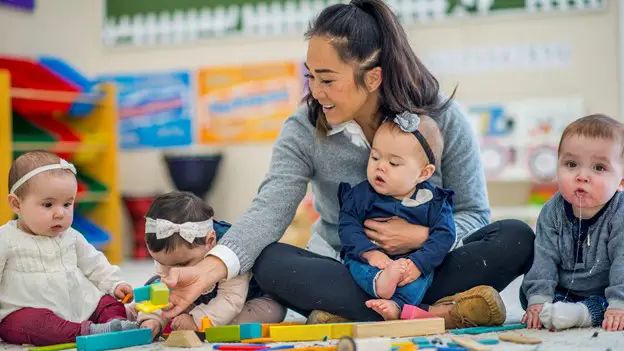
Daycare is generally used as a place for your child to go when you are not home in which they will receive care. While they may also learn and socialize at a young age, daycare is mainly to make sure your baby is fed, changed, and loved in your absence.
The main difference between daycare vs preschool? Daycare may or may not offer academic learning, but in general, they rely on free play and games instead of rigorous structure. Preschool’s goal is to teach pre-academic skills and knowledge.
What about daycare vs staying at home? If you don’t need to send your child you could keep them at home. It is a great way to bond with your little one. You can still socialize them by going to playgroups or out in public. You can teach them whatever you see fit at whatever pace you’d like.
However, even if you don’t have to rely on daycare you could still get your child enrolled part-time just so you get a break and an opportunity to get things done. Typically, neither children who go or don’t go to daycare suffer any disadvantages.
Your child can stay in daycare until kindergarten. But if the center has a preschool program they will likely move into it.
Preschool
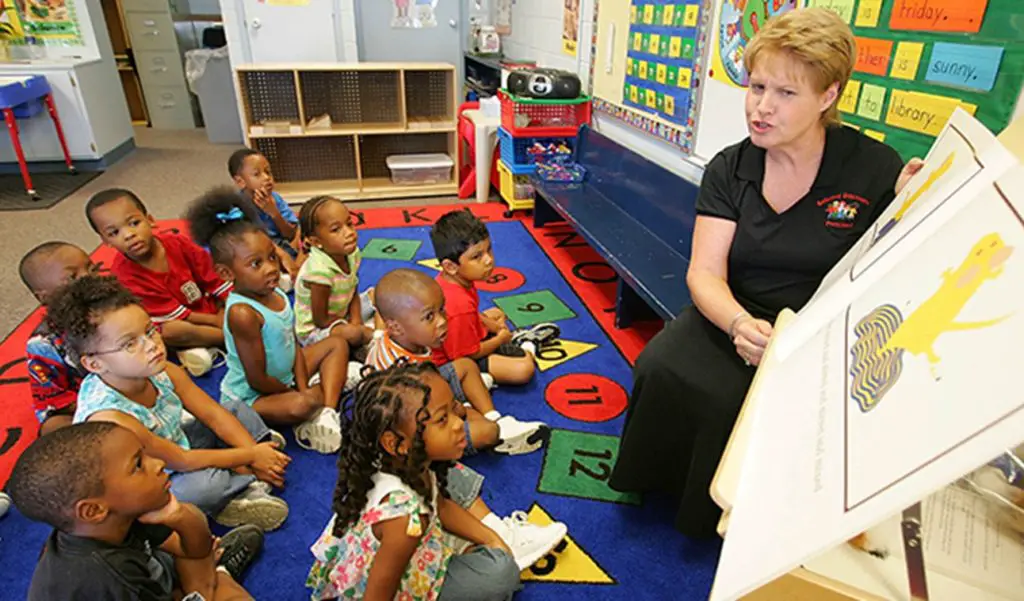
The difference between preschool and daycare is usually age. Daycare is for younger kids (under 2) while preschool is for older children (3-5). Preschool attempts to prepare many children for formal schools by teaching them social like cleaning up toys and academic skills like math and letter sounds.
Still, it is a less formal environment than pre-K. Because of the wide age range, there will still be times for play, naps, and free choice.
Pre-Kindergarten
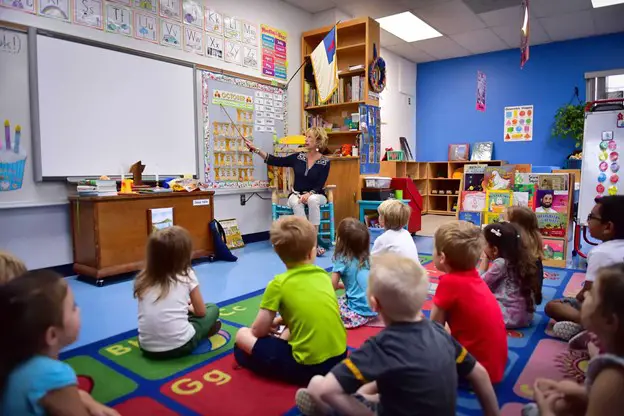
Pre-K is the term given to most federally or state-run programs for kids ages 4 to 5. A preschool classroom can have children as young as 2 but a pre-K classroom will not have children under four-year-old. These programs teach pre-kindergarten skills as their main objective.
A child can go from preschool to pre-K and expect to learn more advanced topics and skills. There may not be a nap period and shorter amounts of time for free play or games. Is pre-k necessary for kindergarten then? Nope! Just a way some parents choose to prepare their child for school year.
The largest difference between these options is age, and the age dictates what kids learn and how.
Is Preschool Mandatory? Do Young Kids Need Preschool Though?
Many parents wonder, is preschool mandatory? And beyond that is preschool necessary before kindergarten? In the United States preschool is not mandatory.
Each state does have an age at which young children must attend kindergarten though [2]. So skipping kindergarten isn’t really an option, even if you do attend preschool. Does my child have to go to preschool before kindergarten you ask? Nope! Not a prerequisite to start school. They can skip a year of preschool or skip preschool altogether.
Pre-school was initially a way for underprivileged children to learn skills necessary to begin kindergarten with the same understanding and knowledge as their more privileged peers.
Nowadays anyone can go to preschool if they choose. Still, preschool vs no preschool is a hot parenting topic apart from discussions like the rise of helicopter parenting.
The answer to do you have to go to preschool is “no” but the answer to do kids need preschool depends on who you ask.
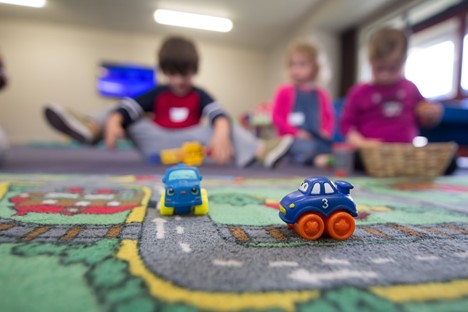
Parents For Preschool
Some parents would argue that kids do need to attend preschool. Preschool is a great pre-primer for actual school. Going from staying home every day or even just playing in a daycare setting to a rigid environment can be shocking. Why make your kids adjust so suddenly when you can ease them into the transition with preschool?
Preschool is also cited by parents as being a good way to learn a variety of skills from a preschool teacher and friends. Kids will learn academic skills but also social, emotional, and developmental skills. A lot of parents worry that their little one, especially if they’re an only child, needs to be socialized.
Preschool can be just the right place to have them interact with other kids and teachers. Parents in support of preschool argue that it teaches kids valuable early childhood lessons that they may not get at home while preparing them for the challenges of formal schooling. Though, it isn’t one hundred percent clear if preschool give kids an academic advantage.
We asked some parents and experts their thoughts on supporting the notion of sending their children to preschool:
“You should never skip preschool, unless you are taking on the role of preschool teacher teaching your child what they teach in preschool at home. Here is the key – preschool is more about social engagement, emotional regulation skills, all the things kiddos need when going to big school- not just academics. A parent should be training their child to have self-regulation skills, how to share, how to ask for help, and even how to sit in a chair (yes circle time requires skills). Preschool teaches students about community, the world around them and how to work with others. We should be focusing on the skills needed to succeed and we can have them even if we skip formal preschool.”
– Dr. Stacy Haynes Ed.D., LPC, of Little Hands Family Services
“I’m a teacher with a degree in education and over a decade of experience teaching kids from preschool through high school.
Kids shouldn’t skip preschool. Many studies have shown that when kids get a high-quality education in preschool, the benefits continue for years to come.
However, a preschool education doesn’t have to look like a full day in a classroom. At this age, kids benefit from a lot of time to play and explore the world around them. Kids often learn more through play than they do in a classroom setting, because they are exploring and making connections on their own.
Parents who want to skip formal preschool can choose to homeschool their kids. Homeschooling preschool doesn’t take long (30-60 minutes per day is plenty) and gives kids lots of time for learning through play. Parents can focus on helping their kids develop pre-reading and early math skills through fun activities. This allows kids to get a high quality preschool experience from home.”
– Sarah Miller of Homeschooling 4 Him
“I am 44 and live in the state of Kentucky. I have 3 boys and we also foster kids. Currently, we have two foster toddlers in our household and one is attending pre-K.
Preschool has always been a fundamental experience for our children. My 3 older boys all participated in pre-K and I feel it gave them a huge advantage once they attended grade school. During their experience in pre-K, they got a head start on learning their alphabet and colors and most of my kids were reading when they hit 1st grade because of this head start.
Pre-K also gives them an advantage socially. They get that time to interact with other kids and other adults outside of our household. This led to our kids being a little more socially outgoing at a younger age and not wanting to stick so close to mom and dad.”
– Gregory Halter of Yearofthedad.com
“I don’t care if my children learn a single letter or number in preschool, but it is essential to me that they attend. As a kindergarten teacher, it is clear to me which children have attended preschool and which have not the moment they walk through the door.
The differences are not what you think; they’re not academic. The most vital skills that preschool teaches cannot be taught at home: becoming a child apart from their parent or guardian.
Students of mine who had attended preschool had an easier time:
– transitioning from one activity to another
– understanding that their desires/needs were going to be met but not always immediately
– joining in with medium-large group games
– separating from parent/guardian in the morning
– sharing classroom items with other students
– building relationships with new adults
– following safety rules especially if it was limiting where a child could go
– understanding school procedures such as circle timeThis does not mean that all children who skipped preschool struggled in every one of those aspects, but it was quite apparent based on their school readiness skills, who had attended preschool and who hadn’t.”
– Ashley Showell of forwardwithfun.com
“I think preschool is a great advantage for children. As a Kindergarten teacher, I know the intense expectations that are put on our students. Deciding to not enroll children in preschool is a huge disadvantage for them academically and socially.
For one, in preschool, students learn how to act in social situations. They learn how to sit quietly, listen to others, work together, stand in a line, and share. All of these are valuable skills to learn for the real world and are taught throughout the year in preschool.
Academically, our students are expected to know a great deal by the time they enter Kindergarten or they are considered “behind”. From knowing their letters and sounds to numbers and counting, and everything in between. It’s also important for children to go to preschool so they know skills like how to hold a book and that when we read, we go from left to right. If a student attends preschool, the teacher does not have to spend as much time (if any) reviewing certain skills because they were already mastered.”
– Jessica Garza of theprimaryparade.com
“I’m a mom of three — a kindergartener, a preschooler, and an infant. The first thing that comes to mind when talking about preschool is that children may learn letters, numbers, words, shapes, and colors. They can also be taught how to write and draw.
More importantly, though, children start to develop social skills when they attend preschool. The environment in preschool helps children learn to share, take turns, work in small groups, and communicate with others. They start to learn how to get along with other people and recognize the feelings of others.
You can get a bit of socialization at the park and at various children’s activities, but I think it’s important for children to interact with the same people every day and make friends without their parents standing next to them.
They also learn to interact with other adults (their teachers) and listen to directions. As they learn these skills, preschool helps children prepare for elementary school.”
– Chelsea Bagley of Nesting Naturally
Parents Opposed to Preschool
On the other hand, families opposed to preschool say it’s simply too much too soon. Kids will spend almost thirteen years in school five days a week, that’s a huge part of a child’s life. Why force them into it any earlier?
Keep your kids home and spend time bonding with them. Teach them family and cultural lessons that they may not get in school. Cherish the moments you have to snuggle, sleep late, run around outside, go on hiking trips together and generally be a kid before starting kindergarten.

Additionally, preschool may be costly for some. It can expose your kid to germs and illnesses and they may get sick more often. It can also provide them with experiences you may not want for them, like being around older kids with not-so-great behaviors. Plus, with preschool alternatives available, like homeschool groups, you could choose another way to ease your kiddo into formal education.
Here’s why some parents think it’s okay to skip preschool:
“I am a mother to five, the youngest is now 8 yrs old. While Preschool is a big fun time for little ones, it is definitely not necessary. As long as someone is working with them in the years leading up to Kindergarten they should be just fine. These days there are a ton of programs you can purchase or download for free that help teach them. If you are worried about socializing them there are playgroups and church groups that can help with that.”
– Elizabeth Ferree of Homemom3.com
“I’m a parent and a grandparent. I do not believe that preschool is necessary – or even desirable! My grandson stayed with us during the day while his mom worked and we had a great time! He played and sang and swam and simply enjoyed life.
Having loving adults near him, his vocabulary and social skills are really good for his age. He has a great deal of curiosity and creativity. I believe that was nurtured because he was kept from a school setting at early ages.”
– Sue Patterson of Unschooling Mom2Mom
“I am a Parent Coach, a former preschool and kindergarten teacher, and have extensive experience as a consultant for Early Childhood Mental Health. Preschool is NOT necessary for kids if at least one parent is home because every skill they need to learn – yes, even socialization – can be taught from home.
Emotionally healthy kids have emotionally healthy parents who support them in learning and practicing those skills throughout daily (and nightly) activities. Young children learn through play, by experience, and by practicing skills in context. Reading often to children, and having them see you use reading in daily activities (recipes, directions, labels, etc) helps them understand the purpose of gaining this skill. The same goes for writing and math. Once this strong foundation is built, reading, writing, and math will come much easier.”
– Kate Fraiser of Connect Point Moms
“As a mother of three, two of whom are preschool age, I believe children should skip preschool. The ages of 0 – 7 are critical for a child’s development. Humans naturally develop and excel as long as the opportunity is awarded and through activities they enjoy, not dictated.
Although children may prefer predictable environments, children between 3 and 5 are constantly changing developmentally, often at different times. Ideally, those environments should change with them. In a uniform setting, this is not usually the case due to the standardization process.
My eldest child, just over 3 1/2, is learning a second language and is aware of kindergarten’s basic requirements without ever attending a preschool. Much of this was self-taught through her curiosity. The approach we took to achieve this was to empower her by observing her learning style, respecting her choices, often acting like children with her, and providing her the space to explore her innate love to learn. The learning is catered to her style.
There may be more order than necessary in a preschool setting, and if a child doesn’t conform to the ‘norm’, this can suppress their learning and development path.”
– Sabah Hashmi of Sabah’s Corner
“I do not believe that preschool is necessary for children. Playtime is more critical for the healthy development of young children than preparing for school is. Children who attend preschool may do better in kindergarten, but continuing advantage beyond that is debated.
I have five children. My oldest is disabled, and she attended a special needs preschool which I believe was a perfect fit for her individual needs. She thrived there. Her school had a high student-teacher ratio (just about 1:1), and her primary teacher is one of the most brilliant and insightful teachers I have ever met.
My other four children haven’t attended preschool, and I don’t plan for them to attend.. I want to let them play freely. At the same time, I understand and have experienced that each child is different and what’s best for one might not be best for another.
Generally speaking, though, I don’t think preschool is essential for a successful life.”
– Melanie Musson, US-based wellness writer for QuickQuote.com
Other Thoughts
We also have parents and educators giving a neutral perspective on the dilemma.
“For some children yes, but not for all. The main purpose of preschool is socialization. Kindergarten teachers are brilliant at teaching premath and prereading skills, what they don’t have time for are basic social skills that most children acquire before Kindergarten.
I say this as a parent and a preschool teacher. Parents can provide regular social opportunities for their child: Playdates, Library events, Music or movement classes, Neighborhood get togethers. Preschool may not be a necessity for your child, thought a good school with caring adults can still be a bonus.”
– Pamela Evans of IvyArtz.com
“I think that the answer depends on many factors which I will try to break down below:
– is the child an only child? If the child is an only child preschool may be the only place that child is able to have social time. Young children need to learn how to socialize and how to behave around others
– is the child in a household with a nanny, parent or other caregiver who can dedicate their time to the child? If the child has a nanny, parent or caregiver who can dedicate time then I would expect them to actually be able to teach what children learn at preschool and to set up playdates with other children the same age so the socializing aspect is covered as well
– does the child speak multiple languages?If so it may be best for the child to attend preschool so that he/she can develop language skills he/she may not develop at home
– does the child have any behavioral issues? If so it may be necessary for the child and the carer to focus this year on developing coping skills
– Is the family new to the area? If so, joining a preschool may be great for the child and the family as it will allow them all to meet new people in the neighborhood.
In general, I would say that skipping preschool does not have a yes or no answer, as with all things related to children and families, one should do what one feels is best for the particular situation they find themselves in.”
– Candida Vajana of www.thefunnynanny.com
“There are definitely some benefits to having your child attend preschool. The biggest one is that it eases your child into the academic world, and researchers believe it gives them an upper hand in school and beyond.
However, the flipside here is that preschool is expensive. The average fees range between $4,500 to $13K per year, depending on the location and quality of preschool.
My kids are all grown up now, but we did send them to preschool when they were younger because it was more affordable. However, it is also understandable for parents to be apprehensive about spending that much, especially those on a tight budget.
Here’s my take: if you’re capable enough and regularly present to provide your children the academic guidance they need during these years, it’s acceptable to skip preschool. After all, they will get to learn the necessary social skills when they get to kindergarten and middle school.”
– Jack Miller of How I Get Rid Of
“I am a 35-year-old mother and wife. Having been through the preschool age with my son, I would say that skipping it depends on the reason you are looking to place your child in preschool.
We first decided to do some preschool at home by doing art activities, watching educational tv, lots of indoor and outdoor play, etc.
Preschool-aged children tend to just do a lot of playing and learning through play which can definitely be done at home.
However, my son is an only child and I wanted him to have some interaction with other children his age (plus mommy needed a break!) so we decided to enroll him.
So if your child is not receiving a lot of interaction with other children and that is something that is important to you, preschool is probably not something you’d want to skip.
However, if you are just wanting to have your children learn through play, you can totally do that at home!”
Ultimately, the choice is up to parents. Preschool isn’t required by law for any school district, and there are plenty of preschool vs no preschool statistics to review [3]. It truly depends on what a family values for their kids.
– Jessica Clark of Glutenfreesupper.com
Skipping Preschool Pros and Cons
From the opinions gathered, we summarize the advantages and disadvantages of kids skipping preschool as follows:
Pros:
- Interact with their peers and learn social skills
- Learn academic lessons and skills that can’t always be taught at home
- Can make the transition to school easier
- Can bond and form a relationship with other trusted adults
Cons:
- Costly and possibly difficult to schedule
- Miss out on childhood experiences, too much rigor too soon
- Less bonding with parents
- Exposure to illness
Important Considerations Before Deciding on Preschool or Skip Preschool
Thinking about not sending a child to preschool? Still, weighing the preschool pros and cons? Here are a few things you may want to keep in mind.
When to start preschool.
Though there isn’t a specific answer to “what age do kids start preschool” don’t overlook this important factor. Some centers have preschool programs as young as 2, but your child may end up in a classroom with much older kids. And, they may not be ready for that.
Alternatively, if your little one is already 5, you may want to consider pre-K instead of preschool. Take a close look at the preschool program you want to enroll in. Review the age range of the class, the skills they are learning and is it developmentally appropriate for your kid’s age? You can ask the program their opinion on the best age to start preschool.
Where to start preschool.
Depending on where you live you may have quite a few choices as to where to send your child. You can probably meet with the director at each one. They can give you an overview of the program, answer questions about what a typical day looks like, and even let you tour a classroom.
Make sure you thoroughly vet each place before deciding on one.
How much preschool.
You don’t have to send your kiddo every day. Chances are you can enroll them part-time. This might be best for your schedule, your budget, or even your baby’s age.
Many centers offer a couple of days a week, half days, and full time. You can choose to teach them more skills at home if you only want to do part-time with the use of fun activities and helpful products like Montessori toys or activity books.
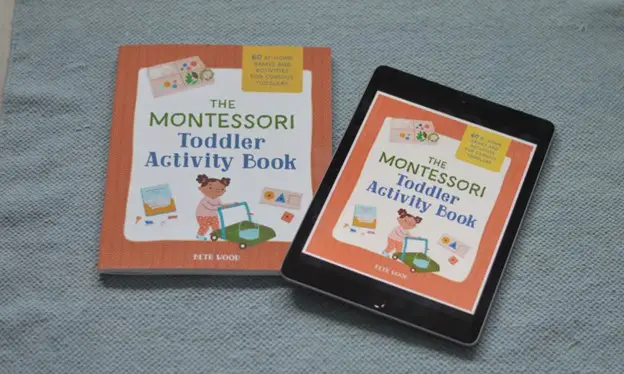
Preschool Positives and Negatives
As with almost every decision you will make for your little one, there are advantages and disadvantages to preschool. We hope this helpful article has guided you to the best choice for your family and answered your burning questions.
If you have more questions or wish to share your opinion on the topic, be sure to comment below!
—
